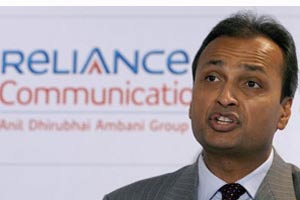NEW DELHI: French media and telecom giant Vivendi is negotiating with Reliance Communications (RCom) to buy a 26% stake in the firm, as the Anil Ambani-led company seeks to bring down the level of debt.
 The two companies have been talking for a month and “discussions are now at an advanced stage”, said a person with direct knowledge of the negotiations. A top Vivendi team was in Mumbai last week to settle the contours of the deal.
The two companies have been talking for a month and “discussions are now at an advanced stage”, said a person with direct knowledge of the negotiations. A top Vivendi team was in Mumbai last week to settle the contours of the deal.
Another person close to the negotiations told that Vivendi is the front-runner in RCom’s quest for a strategic partner, in which the UAE-based telecom service provider Etisalat is believed to be another contender.
If Vivendi acquires a 26% stake, which will be by way of a fresh issue of shares, it would have to make an open offer for another 20%, according to Sebi guidelines.
If the deal with Vivendi goes through, Mr Ambani’s stake would come down to 51%. “The Vivendi deal is the simplest. Unlike Etisalat, Vivendi does not have an existing stake in an Indian telecom company,” the person said.
Vivendi chairman Jean-Bernard Levy declined to comment on any possible deal with RCom as did a Vivendi spokesperson in Paris.
An RCom spokesperson said the company has already informed the Indian stock exchanges about its plans to sell strategic stake, but declined further comment. International consultant AT Kearney has been hired by Vivendi to chalk out its India strategy.
Vivendi has telecom operations in France, Morocco and Brazil. It controls Morocco’s dominant telecom operator Maroc Telecom SFR, France’s second-largest mobile operator and Brazil’s fastest growing telecom operator GVT.
It had also been in talks with Zain last year to buy the company’s African assets which were subsequently acquired by Bharti.
The company, so far focussed on Africa and Latin America, is said to have been interested in the Indian market for a while and had reportedly been in talks with Videocon to pick up stake in its fledgling telecom venture a few months ago.
Mr Levy had told Bloomberg in March that while India and China were more complex markets, the Indian mobile phone market was “very exciting”.
RCom had a net debt of Rs 19,889 crore as of March-end with an Ebitda, of Rs 7,820 crore. Add to that Rs 8,585 crore the company will pay for 3G spectrum and a likely large sum for WIMAX spectrum and its debt to Ebitda multiple, used as a measure of a company’s future access to cash, will be above five times, much higher than its competitors. As a result, analysts say the company needs to mobilise fresh equity.
Two weeks ago, the company’s board approved a proposal to sell strategic stake. Last week, RCom announced it would restructure the ownership of its tower arm, Reliance Infratel, and make it an independent tower company.
Half of RCom’s debt is on account of its tower business. The company had also said it was in talks with several domestic and international players for value creation opportunities.
“The Reliance Infratel deal would be announced before the strategic stake sale,” said the person quoted earlier. Besides Etisalat, MTN, the South African telecom company, has also been referred to as a partner for RCom.
However, any transaction with MTN would likely involve RCom becoming a subsidiary of the SA company and Anil Ambani taking a stake in MTN.
MTN has denied being interested in such a deal. India may fit the bill for Vivendi, which is planning to raise the share of revenues from emerging markets to 24% of the total from the current level of about 15% of its more than 25 billion euros of revenue, analysts say.
It bought a controlling stake in Brazilian telco GVT in November 2009.
Despite the tariff war in India, it could be commercially alluring for Vivendi to test the waters in a nation with more than a 100 crore population where 1.2 crore subscribers are added every month.
Vivendi may also be financially comfortable enough to expand in emerging markets after it agreed to sell its 20% stake in television network and movie studio NBC Universal for $5.8 billion to General Electric.
“Vivendi should have financial headroom to engage in more M&A which we expect the company to continue to pursue in the emerging markets,” HSBC Global Research said in a December 2009 report.


